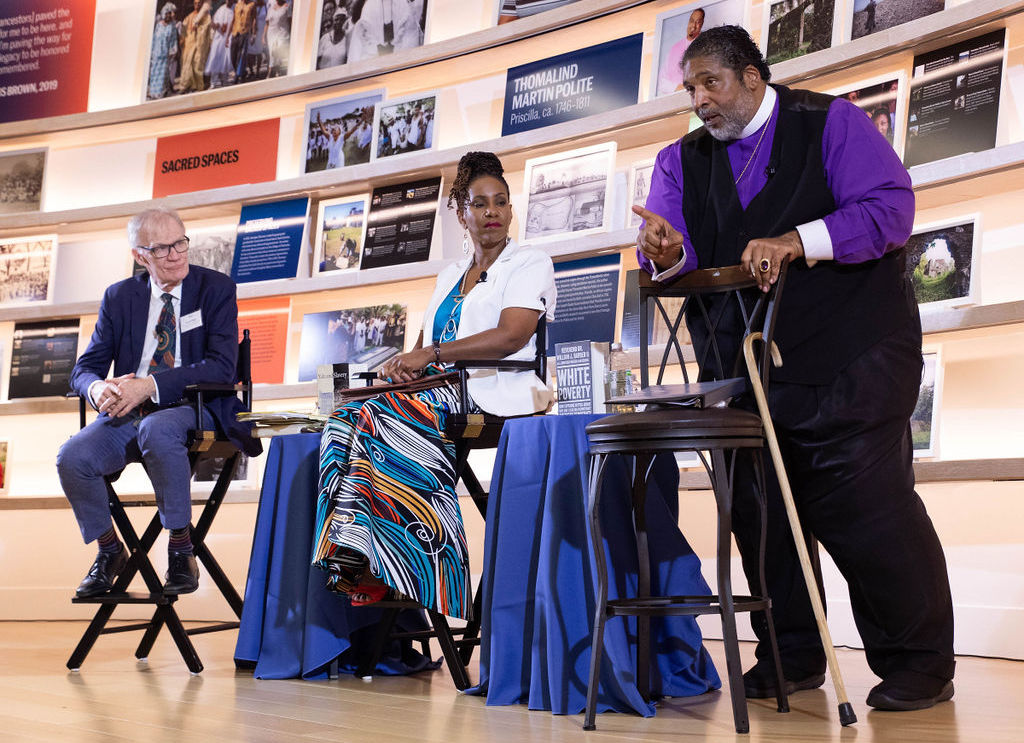Divinity School reckons with Yale’s ties to slavery at International African American Museum in Charleston
On Saturday, Sept. 14, Yale Divinity School hosted an event at the IAAM in Charleston, South Carolina, which featured a panel with Yale professors David Blight and William J. Barber II.

Courtesy of Trenise Elmore
When Elijah Heyward III DIV ’07 used to study in the Yale Divinity School library late at night, he would often scan the walls for people who looked like him.
“I would look for Black students. I would be like okay if this guy from the 1900s was here and was able to make it, I’m going to make it too,” said Heyward. “It offered me hope.”
This past weekend, the Divinity School sponsored an event in Charleston, South Carolina, to discuss how Yale and the Divinity School in particular is reckoning with its ties to slavery and looking towards the future.
The event was hosted at the International African American Museum, a new museum in Charleston located on the site of Gadsden’s Wharf which is where more than 260,000 enslaved Africans landed between 1670 and 1807. Heyward is the former chief operating officer of the museum. The event included a panel discussion with Yale professors William J. Barber III and David Blight, Tonya Matthews, president and CEO of the International African American Museum and Divinity School Dean Gregory Sterling.
During the event, panelists discussed the significance of Yale’s ties to slavery and what Yale can do to recognize this history moving forward. Sterling spoke to the News about recent initiatives at the Divinity School to reckon with the history of slavery at Yale.
“I and a lot of people here at the Divinity School feel very strongly that racism is still a very real problem in our country. We made a statement apologizing for the Divinity School’s role and set aside 20 million dollars of our endowment for social justice scholarships,” Sterling said. “We’ve made a priority of trying to diversify the school so 15 out of 25 full-time hires for faculty have been from underrepresented groups. We’ve tripled the number of faculty from underrepresented groups, we’ve doubled the number of staff and doubled the number of students. We changed our curriculum and our walls.”
In 2020, Yale launched the Yale and Slavery Research Project, an initiative to study Yale’s institutional involvement with slavery. Last year, Blight, the Sterling Professor of History, published the book “Yale and Slavery: A History,” which explores key findings in Yale’s past ties to slavery.
In the 1830s, James Pennington, a former enslaved person, made history by being the first Black person to attend classes at the Yale Divinity School and the University at large. Now, there is a large portrait of Pennington on display at the Divinity School.
“So what it means to walk through the halls now is that I don’t have to go and look for those singular individuals in those class portraits, but it’s there’s a very pronounced and decisive representation of the values of the institution that I care about that will hopefully not only inspire me but other students from all backgrounds to understand their place in this work of making our society a better place,” Heyward said.
At the event, Blight spoke about the research project that became the book and his goals in doing research on the history of slavery at Yale. Blight spoke of three goals in writing the book.
“We first wanted to know the history of Yale, that college that became a university. Then we wanted to tackle this story within Connecticut, within New England and within the American nation,” Blight said at the event, according to a transcript of the event provided by Tom Krattenmaker, director of communications at the Divinity School. “It had international ties from almost the very beginning, especially to the West Indies, a very deep tie to the sugar islands of the West Indies and the slave systems of the West Indies. And the third thing we wanted to dive deep into was New Haven itself, our city, the town and particularly the Black community that was forged in New Haven from the earliest days of Yale College in the early 18th century.”
All of this scholarship has contributed to the ability for Yale and the Divinity School to reckon with its ties to slavery.
Barber, a professor in the practice of public theology and public policy, spoke at the panel about the importance of Yale coming to terms with its history, especially now.
“We can no longer, when you read this study, suggest that slavery and racism was just a southern problem … that is why Yale has to do what it’s doing today,” Barber said, according to the transcript. “It has to be at the front of repair, reparation and transformation.”
The International African American Museum in Charleston, South Carolina, opened its doors in 2023.







